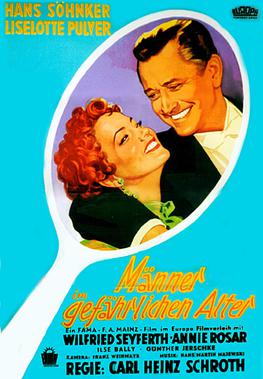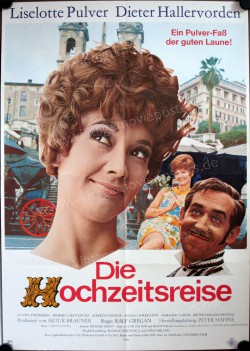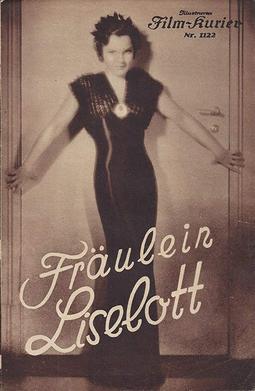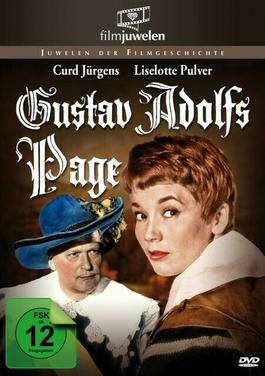
A Heidelberg Romance is a 1951 West German romance film directed by Paul Verhoeven and starring Liselotte Pulver, O.W. Fischer and Gardy Granass. While accompanying his daughter on a trip to Heidelberg, a wealthy American businessman recounts a romance he had with a local girl forty years before. The film set a template for portraying German-American relations.

Swiss Tour is a 1949 American-Swiss drama film directed by Leopold Lindtberg and starring Cornel Wilde, Josette Day and Simone Signoret. It marked the film debut of Liselotte Pulver who went on to be a major star of German cinema during the following decade.

Oh, You Dear Fridolin is a 1952 West German comedy film directed by Peter Hamel and starring Hans Reiser, Ingrid Andree and Otto Gebühr. It was shot at the Bendestorf Studios near Hamburg and on location around Munich. The film's sets were designed by the art director Hans Berthel.

Fritz and Friederike is a 1952 West German comedy film directed by Géza von Bolváry and starring Liselotte Pulver, Albert Lieven, and Margarete Haagen. It was made at the Wiesbaden Studios in Hesse. The film's sets were designed by the art directors Heinrich Beisenherz and Alfred Bütow.

Klettermaxe is a 1927 German silent crime film directed by Willy Reiber and starring Dorothea Wieck, Corry Bell and Paul Heidemann. The story was remade as a sound film in 1952.

Men at a Dangerous Age is a 1954 West German comedy film directed by Carl-Heinz Schroth and starring Hans Söhnker, Liselotte Pulver and Annie Rosar. It was shot at the Wandsbek Studios in Hamburg. The film's sets were designed by the art directors Mathias Matthies and Ellen Schmidt.

The Bogeyman is a 1953 West German crime comedy film directed by Carl Boese and starring Liselotte Pulver, Hans Reiser, and Harald Paulsen. It was shot at the Wandsbek Studios in Hamburg. The film's sets were designed by art director Mathias Matthies.

Reaching for the Stars is a 1955 West German drama film directed by Carl-Heinz Schroth and starring Erik Schumann, Liselotte Pulver and Gustav Knuth.

The Wedding Trip is a 1969 German-Italian comedy film directed by Ralf Gregan and starring Liselotte Pulver, Dieter Hallervorden and Ewa Strömberg.

Five Leaf Clover is a 1972 French comedy film directed by Edmond Freess and starring Philippe Noiret, Liselotte Pulver and Micha Bayard.

We'll Talk About Love Later is a 1953 West German comedy film directed by Karl Anton and starring Gustav Fröhlich, Maria Holst and Liselotte Pulver.

Confessions of Felix Krull is a 1957 West German comedy and drama film directed by Kurt Hoffmann and starring Horst Buchholz, Liselotte Pulver, and Ingrid Andree. It is based on the 1954 novel of the same title by Thomas Mann. The story was later made into a 1982 television series The Confessions of Felix Krull. It was shot at the Wandsbek Studios in Hamburg and on location in Lisbon. The film's sets were designed by the art director Robert Herlth. Mann's novel was made into a movie again in 2021.

Beloved Liar is a 1950 West German romantic comedy film directed by Hans Schweikart and starring Elfie Mayerhofer, Hans Söhnker and Gustav Knuth.

Theodore the Goalkeeper is a 1950 Austrian-German sports comedy film directed by E. W. Emo and starring Theo Lingen, Hans Moser, and Josef Meinrad.

Men Are That Way is a 1939 German drama film directed by Arthur Maria Rabenalt and starring Hertha Feiler, Hans Söhnker and Hans Olden. The film's sets were designed by the art director Willi Herrmann. It was remade by Rabenalt in Austria as Arena of Fear (1959).

School for Marriage is a 1954 West German comedy film directed by Rainer Geis and Anton Schelkopf and starring Wolf Albach-Retty, Cornell Borchers, and Liselotte Pulver. It was shot at the Bavaria Studios in Munich and on location in the Alps and in Paris. The film's sets were designed by the art director Ludwig Reiber.

Where the Truth Lies is a 1962 French thriller film directed by Henri Decoin and starring Juliette Gréco, Jean-Marc Bory and Liselotte Pulver.

The Beautiful Adventure is a 1959 West German comedy film directed by Kurt Hoffmann and starring Liselotte Pulver, Robert Graf and Bruni Löbel.

Miss Liselott is a 1934 German comedy film directed by Johannes Guter and starring Magda Schneider, Albert Lieven, and Maria Sazarina. The former silent director Franz Hofer worked as assistant director on the film.

Gustav Adolf's Page is a 1960 German-Austrian historical adventure film directed by Rolf Hansen and starring Liselotte Pulver, Curd Jürgens, and Ellen Schwiers. It is based on the 1882 novel of the same title by Conrad Ferdinand Meyer.




















